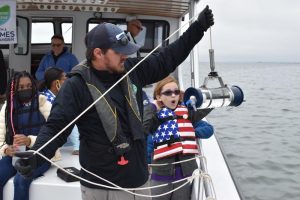
The James River Association emerged in 1976 after a toxic disaster rendered Virginia’s 348-mile James River among America’s most polluted waterways. For 10 years, a Hopewell chemical plant illegally dumped Kepone, a hazardous insecticide, into the river, before workers developed neurological symptoms and the state closed the facility. But the damage was already done – the contamination led to a 13-year ban on commercial fishing, devastating not only the fishermen themselves but also the communities and businesses that relied on the industry. Based in Richmond, the group’s mission is to be a guardian of the James River, promoting conservation and responsible stewardship of its natural resources. Over 3 million Virginians living within the 10,000 square mile watershed rely on the river for clean drinking water, recreation, and potentially their livelihoods. JRA’s efforts, including mitigating stormwater runoff from developments, educational programs and webinars, planting trees to reduce pollution, restoring shorelines, and increasing public access to the river, have brought the James River back from the brink. Yet, the work is far from over.

James River Association educators offer a host of programs across the watershed that include canoeing, kayaking, water quality testing, and wetland ecosystem investigations.
What began as a small volunteer organization over 40 years ago, JRA has seen unprecedented growth and success. With a staff of 42, and regional offices throughout the watershed, they remain focused on restoring and protecting the James’ ecosystems. In 2023, JRA engaged over 579 partners and volunteers in riparian buffer events and workshops and planted 31,198 trees, 90 acres of newly-restored riparian forest buffers, and 1,011 acres of existing buffers. With 152 partners, they created tidal marshes to control shoreline erosion, absorb flood waters and pollutants, and act as a habitat for native animals. JRA played an integral role in the Commonwealth’s adoption of a budget bringing a record $728 million in water quality, resilience, and land conservation funding. As well, JSA educators provided hands-on learning to 21 school districts and 19,261 students across the watershed. From paddle programs and field experiences, students connected directly with their James River from the headwaters to the mouth.